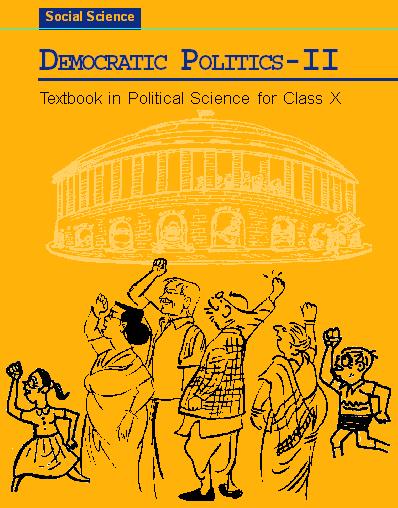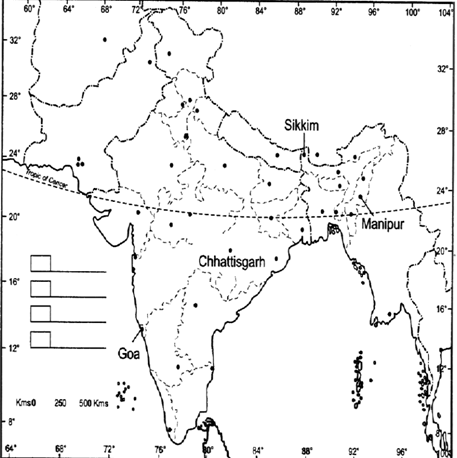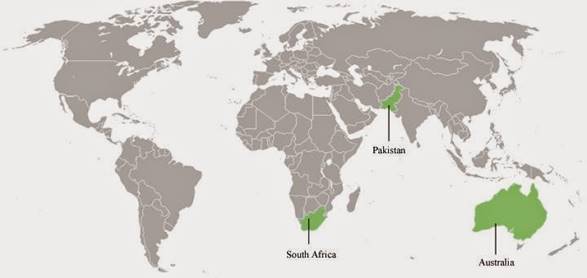NCERT Solutions for Class 10 Social Science Political Science Federalism Chapter 2 are available in PDF format for free download. These ncert book chapter wise questions and answers are very helpful for CBSE exam. CBSE recommends NCERT books and most of the questions in CBSE exam are asked from NCERT textbooks. Class 10 Social Science chapter wise NCERT solution for Social Science part 1 part 2 Part 3 and Part 4 for all the chapters can be downloaded from our website and myCBSEguide mobile app for free.
NCERT Solutions for Political Science Class 10 Download as PDF
NCERT Class 10 Social Science Chapter-wise Solutions
Economics
- Development
- Sector of Indian Economy
- Money and Credit
- Globalization of Indian Sector
- Consumer Rights
Geography
- Resources and Development
- Forest and Wildlife Resources
- Water Resources
- Agriculture
- Minerals and Energy Resources
- Manufacturing Industries
- Lifelines of National Economy
History
- The Rise of Nationalism in Europe
- The Nationalist Movement in Indo China
- Nationalism in India
- The Making of a Global World
- The Age of Industrialisation
- Work Life and Leisure
- Print Culture and The Modern World
- Novels Society and History
Civics
- Power Sharing
- Federalism
- Democracy and Diversity
- Gender Religion Caste
- Popular Struggle and Movements
- Political Parties
- Outcomes of Democracy
NCERT solutions for Class 10 Social Science Political Science Federalism
Question 1. Locate the following States on a blank outline political map of India: Manipur, Sikkim, Chhattisgarh and Goa.
Answer:

Question 2. Identify and shade three federal countries (other than India) on a blank outline political map of the world.
Answer:

Explanation:25 countries of the192 countries in the world have federal political systems.
Question 3. Point out one feature in the practice of federalism in India that is similar to and one feature that is different from that of Belgium.
Answer: In India, just like in Belgium, the central government has to share its powers with the State governments. However, unlike Belgium, India does not have a communist government in addition to the central and the state government. India has rural local government popularly known as Panchayati Raj.
Question 4. What is the main difference between a federal form of government and a unitary one? Explain with an example.
Answer: In a federal form of government, the central government shares its powers with the various constituent units of the country. Both types of governments are separately answerable to the people. For example, in India, power is divided between the Central Government and the various State governments.
In a unitary form of government, all the power is exercised by only one government. In this, the Central government can pass orders to the provincial or the regional government. Under the unitary system, either there is only one level of government or sub-units are subordinate to the central government. For example, in Sri Lanka, the national government has all the powers.
Question 5. State any two differences between the local government before and after the Constitutional amendment in 1992.
Answer: A major step towards decentralization was taken in 1992. The Constitution was amended to make the third-tier of democracy more powerful and effective.
| Local governments Before 1992 | Local governments After 1992 |
| Elections were controlled by the state and not held regularly. Seats were not reserved in the elected bodies for women. | An independent State Election Commission is responsible to conduct panchayat and municipal elections. At least one-third of all the positions are reserved for women. |
| Local governments did not have any powers or resources of their own. These were directly under the control of state governments. | The State governments are required to share some powers and revenue with local government bodies. The nature of sharing varies from state to state. |
Question 6. Fill in the blanks:
Since the United States is a ___________________ type of federation, all the constituent States have equal powers and States are ______________vis-à-vis the federal government. But India is a _____________________ type of federation and some States have more power than others. In India, the ____________ government has more powers.
Answer: The United States is a coming together type of federation, all the constituent States have equal powers and States are strong vis-à-vis the federal government. India, on the other hand, is a holding together type of federation and some of the states have more power than others. The Central government in India has more powers.
Question 7. Here are three reactions to the language policy followed in India.
Give an argument and an example to support any of these positions.
Sangeeta: The policy of accommodation has strengthened national unity.
Arman: Language-based States have divided us by making everyone conscious of their language.
Harish: This policy has only helped to consolidate the dominance of English over all other languages.
Answer: I fully agree with Sangeeta’s reaction to this. If the policy of accommodation was not followed and states were not created on linguistic basis, then there would have been a further partition of India. The formation of linguistic states has actually made the country more united and has also made the administration much easier for example imposition of Hindi as the national language would have led the South to break away from North and south in Tamil Nadu would have become an independent nation. So parliament enacted the Official Language Act of 1963 which provided for the continued use of English for official purposes along with Hindi, even after 1965.
Question 8. The distinguishing feature of a federal government is:
(a) National government gives some powers to the provincial governments.
(b) Power is distributed among the legislature, executive and judiciary.
(c) Elected officials exercise supreme power in the government.
(d) Governmental power is divided between different levels of government.
Answer: (d) Governmental power is divided between the different levels of government.
Explanation: The levels are the Central Government, the State Government and the Panchayati Raj.
Question 9: A few subjects in various Lists of the Indian Constitution are given here. Group them under the Union, State and Concurrent Lists as provided in the table below.
A.Defence; B. Police; C. Agriculture; D. Education; E. Banking; F. Forests; G. Communications; H. Trade; I. Marriages
| Union List | |
| State List | |
| Concurrent List |
Answer :
| Union List | Defence, Banking, Communications |
| State List | Police, Agriculture, Trade |
| Concurrent List | Education, Forests, Marriages |
Explanation: Union list includes the subjects of national importance.
State list contains the subjects of state and local importance.
Concurrent list includes the subjects of common interests to both the Union Government as well as the State Governments.
Question 10. Examine the following pairs that give the level of government in India and the powers of the government at that level to make laws on the subjects mentioned against each. Which of the following pairs is not correctly matched?
| (a) | State government | State List |
| (b) | Central government | Union List |
| (c) | Central and State government | Concurrent List |
| (d) | Local Governments | Residuary powers |
Answer :
| (d) | Local Governments | Residuary powers |
Explanation: Matters which are not included in any of the three lists are known as residuary subjects and the right to make laws on these subjects is called residuary power. The central government (the Parliament) has been given rights to legislate on these subjects.
Question 11. Match List I with List II and select the correct answer using the codes given below the lists:
| List I | List II | |||
| 1. Union of India | A. Prime Minister | |||
| 2. State | Β. Sarpanch | |||
| 3. Municipal | C. Governor | |||
| 4. Gram Panchayat | D. Mayor | |||
| 1 | 2 | 3 | 4 | |
| (a) | D | A | B | C |
| (b) | B | C | D | A |
| (c) | A | C | D | B |
| (d) | C | D | A | B |
Answer :
| 1 | 2 | 3 | 4 | |
| (c) | A | C | D | B |
Question 12. Consider the following two statements.
- In a federation, the powers of the federal and provincial governments are clearly demarcated.
- India is a federation because the powers of the Union and State Governments are specified in the Constitution and they have exclusive jurisdiction on their respective subjects.
- Sri Lanka is a federation because the country is divided into provinces.
- India is no longer a federation because some powers of the States have been devolved to the local government bodies.
Which of the statements given above are correct?
(a) A, B and C
(b) A, C and D
(c) A and B only
(d) B and C only
Ans : (c) A and B only
Explanation: All levels of governance will govern the same citizens, but their jurisdiction will be different. This means that each level of government will have a specific power to form laws, legislate and execute these laws. Both of the governments will have clearly marked jurisdiction.
NCERT Solutions for Class 10 Social Science
CBSE app for Class 10
To download NCERT Solutions for class 10 Social Science, Computer Science, Home Science, Hindi, English, Maths Science do check myCBSEguide app or website. myCBSEguide provides sample papers with solution, test papers for chapter-wise practice, NCERT solutions, NCERT Exemplar solutions, quick revision notes for ready reference, CBSE guess papers and CBSE important question papers. Sample Paper all are made available through the best app for CBSE students and myCBSEguide website.

Test Generator
Create question paper PDF and online tests with your own name & logo in minutes.
Create Now
Learn8 App
Practice unlimited questions for Entrance tests & government job exams at ₹99 only
Install Now